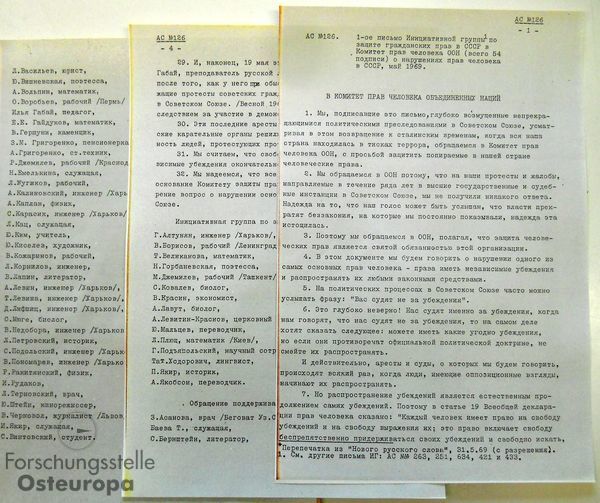14:00 Staats- und Universitätsbibliothek, Vortrag
Susanne Schattenberg
Der tägliche Krieg nebenan. Die Ukraine im fünften Kriegsjahr
18:00 Marktplatz Bremen
Kundgebung
Solidarität mit der kämpfenden Ukraine
19:00 Dom zu Bremen
Friedensgebet
Ökumenisches Gedenken an den russischen Überfall auf die Ukraine
Wissenswertes
The First Human-Rights Defense Group in the Soviet Union
On the 50th anniversary of the foundation of the “Initiative Group for the Defense of Civil Rights in the USSR”

Archiv der Forschungsstelle Osteuropa, Archiv Samizdata, Nr. 126, Mai 1969.
In the aftermath of the invasion of Czechoslovakia, the Soviet authorities increased their pressure on the dissident movement. One after another, Soviet human-rights activists were put on trial and sent to the camps or locked in psychiatric hospitals. Reading and circulating samizdat and tamizdat literature, signing protest letters, or taking part in unsanctioned demonstrations were the usual motives of incrimination.
In May 1969, Soviet dissidents Piotr Iakir and Viktor Krasin decided to form a human rights defense group to protest these human rights violations: Tatiana Velikanova, Natalia Gorbanevskaia, Sergei Kovaliov, but also Crimean Tatar activist Mustafa Dzhemilev were among the fifteen group members. Their first action was to write an open letter to the UN Human Rights Committee. As they stated in their letter, they had grown disillusioned with the Soviet authorities’ lack of reaction to their previous calls. They had therefore decided to turn to the UN, which they believed had a “sacred duty” to protect human rights. They denounced the prosecution of Soviet activists for their “independent convictions” and for the dissemination of their ideas, and provided a list of recent political trials. In addition to the fifteen group members, thirty-nine signatories expressed their support to the letter.
The Initiative Group was the first of a series of human rights groups in the Soviet Union. In the 1960s, Soviet dissidents had been united by their desire to lobby the Soviet leadership to obtain political change, but by the turn of the decade, their strategy had changed: they adopted the language of human rights to express their grievances and started appealing to international organizations and Western political actors. Forming an organized group to issue collective appeals to the West was a daring endeavor, however, given that collective action had traditionally been more harshly punished in the USSR. The arrest and emigration of most members of the group in the early 1970s dealt a great blow to the group’s actions. Moreover, the Initiative Group’s dozens of open letters to the United Nations remained unanswered. After 1975, only two members of the group continued to sign protest letters, mostly in conjunction with the Moscow Helsinki Group, founded in May 1976.
The Initiative Group’s first open letter, as well as subsequent appeals, were reproduced in the samizdat collection “Sobranie Dokumentov Samizdata” produced by Radio Liberty/Radio Free Europe, copies of which are conserved at the Bremen Archive. This document marks a turning point in the history of Soviet dissent: the shift from petition campaigns aimed at the Soviet leadership to the so-called “boomerang strategy”: appeals to Western politicians and institutions voiced in the language of human rights, to put indirect pressure on the Soviet leaders.
Further reading
Liudmilla Alexeyeva: Soviet Dissent. Contemporary Movements for National, Religious, and Human Rights, Middletown Conn 1985.
Peter Reddaway: Uncensored Russia. Protest and Dissent in the Soviet Union. The Unofficial Moscow Journal, a Chronicle of Current Events. New York 1972.
Barbara Martin
Länder-Analysen
» Länder-Analysen
» Eastern Europe - Analytical Digests
Discuss Data
Archiving, sharing and discussing research data on Eastern Europe, South Caucasus and Central AsiaOnline-Dossiers zu
» Erdgashandel
» Hier spricht das Archiv
» Russian street art against war
» Dissens in der UdSSR
» Duma-Debatten
» 20 Jahre Putin
» Protest in Russland
» Annexion der Krim
» sowjetischem Truppenabzug aus der DDR
» Mauerfall 1989

